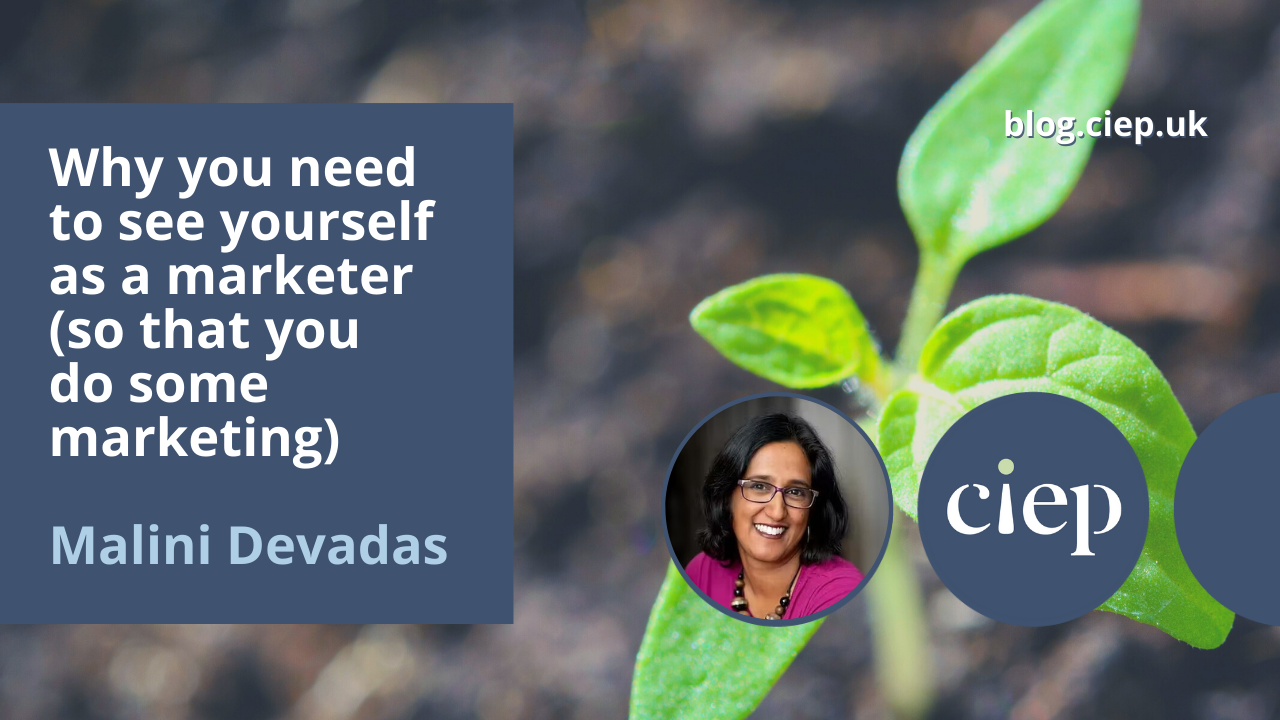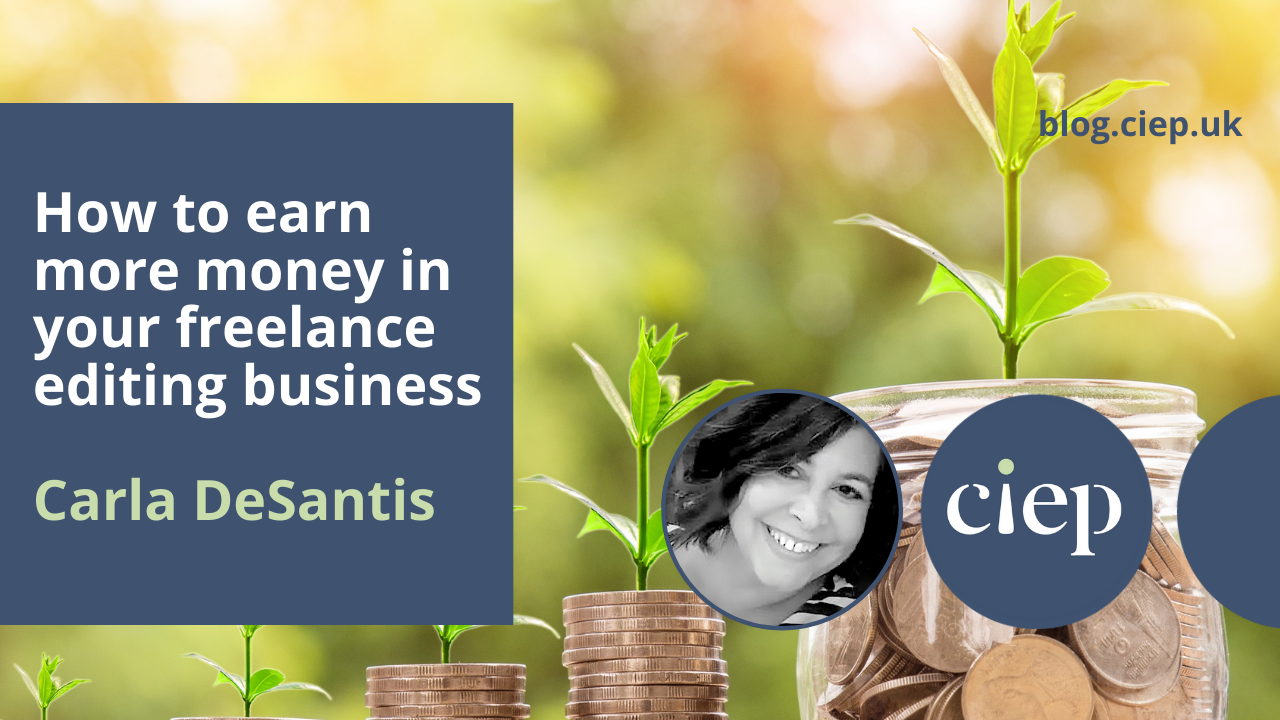In this post, Malini Devadas talks about why you need to see yourself as a marketer, and feel comfortable in that identity, in order to actually do any marketing. She also shares one action that you can take today to find your next client.
There’s a model in coaching that I love, which is called ‘be, do, have’. Most freelancers want to have more clients, and they know that in order to do that they need to do some marketing. So they learn all about marketing; in other words, they focus on the doing. However, we won’t do something if it is in conflict with who we see ourselves as being. If we spend our time thinking about how much we hate selling, if we feel resentful about the fact that we need to be proactive about finding clients, or if we see ourselves as someone who is hopeless at marketing, we are unlikely to take marketing action. Instead of acknowledging the root cause of the problem, we decide it’s because we don’t know the ‘right’ marketing strategy. We then spend more time reading and learning about new platforms and tactics, because that feels easy and safe compared to actually putting ourselves out there.
As a transformational coach, my job is to help editors become someone who is comfortable with marketing and who even learns to enjoy connecting with writers they’d like to work with. Yes, it is possible! Here are some steps to get started.
Be comfortable with marketing and selling
The best way we can help a writer is to edit their piece (assuming that we are a good fit for the project). So, it’s in their best interest to know about what we do and how we can help them. They may decide not to work with us, but if they don’t even know that we exist, they are being denied the opportunity to get help.
Because selling, and talking about money more generally, can feel awkward, a lot of freelancers focus on giving away free content to help writers, such as through social media posts, blogs and podcasts. This has a place; personally, I like to give away free content so that I can help those who don’t have the budget to work with me. But I also think it’s important to share the message that I can help you more if you hire me, and invite people to contact me if they want to discuss the options.
I don’t think it’s likely that you’re going to go from hating something to loving it, so I’m not suggesting that you try to convince yourself that marketing your business is your new favourite pastime. Instead, I encourage you to start by feeling neutral about it. When the topic comes up, instead of joining in the chorus of complaints about having to do marketing or how bad you are at it or criticising other service providers who sell their services, don’t say anything. This may feel uncomfortable at first, especially if you’re used to leading the chorus of complaints. But over time you will notice that you no longer have such strong negative views about marketing and selling. And that will make it easier for you to do it.
Be confident in your offer
Yes, it’s the dreaded concept of niching! Having a niche for marketing purposes does not mean that you can’t have variety in your work. But if you are connecting with writers, it is much easier for you to find the right people, and for them to have more confidence in you, if you’re clear on the problem you solve (your offer). For example, do you proofread food blogs before they are published on a website? Do you do developmental editing of romance novels for first-time authors who eventually want to self-publish? Do you copyedit PhD theses for students in the sciences at Australian universities?
Put yourself in the shoes of a writer who thinks they might need help to reach their goals. If you don’t show empathy for your clients then it will be hard to write content that will appeal to them. If you spend all your time talking about the editing process, it is hard to connect with people, because many people outside publishing don’t understand what editing actually is. Instead, you want to be talking about things that matter to the people you want to work with.
And if you’re not sure what matters to your ideal clients, find some of them and ask them!
Be open to receiving more money
It may sound ridiculous, but it can be hard for some people to receive money. Here are some signs that you might be one of these people:
- You stall on sending an invoice because you feel bad, especially if the invoice is for a lot of money (even if the client is happy).
- You feel guilty about how much you earn compared to other people (eg parents, other family members, people with ‘more important’ jobs).
- You feel bad about being paid for work you enjoy.
- You think that people who earn a lot are greedy.
There are any number of limiting beliefs out there when it comes to money, and these can have a huge impact on how we run our business. Over the years, many editors I have coached have been shocked to discover all the negative thoughts they have about money.
Next time you find yourself criticising someone about their rates or making assumptions about what a potential client is willing to pay you, stop and consider how these thoughts may be hampering your business.
One action you can take today to find your next client
The easiest way to find a client is to start with your existing network, even if it is tiny. Here’s a script that I have used (and that has worked!) when I’ve needed more clients. You can use it to email someone you know.
Dear
[Some kind of introductory remarks.]
I wanted to let you know that I have recently started an editing business. I help [type of client/publication and the problem you solve].
You can find out more at my website [insert link]. (If you don’t have a website, just include any relevant information at the end of the email.)
If you think you might need my help, I’d love to make a time to chat about it. Or, if you know someone who might benefit from my services, I’d appreciate you forwarding this email to them.
[Some kind of sign-off.]
That’s it. Don’t overcomplicate it!
If you’re struggling to send one email about your business to someone you know, this is an opportunity to look inwards and work out what the fear is that is getting in the way. Because until you uncover and deal with that, it’s going to be difficult to do the marketing that you need to do to grow your business.
This is not so much about expecting this one person to respond and offer you work. Statistically, in fact, this is unlikely to happen (this is why we need to tell lots of people about our business, to increase our chances of finding work). Instead, it is about taking responsibility for your business and telling the universe that you are ready to meet more of your ideal clients.
Going forward
Remember, so many writers need your services! But they can’t get help for their manuscript if they don’t know that you exist. Spend time building connections with your ideal clients and let them know how you can help them. Before you know it, you will be getting enquiries from people you want to work with on projects you find interesting.
About Malini Devadas
Dr Malini Devadas has been an editor since 2004 and a coach since 2018. Over the past five years, she has been helping editors learn to enjoy marketing and selling so that they can find more clients and earn more money. Malini takes on a few 1:1 coaching clients when her schedule allows. To find out more, you can email Malini (malini@mdwritingediting.com.au).
 About the CIEP
About the CIEP
The Chartered Institute of Editing and Proofreading (CIEP) is a non-profit body promoting excellence in English language editing. We set and demonstrate editorial standards, and we are a community, training hub and support network for editorial professionals – the people who work to make text accurate, clear and fit for purpose.
Find out more about:
Photo credits: green shoot by PhotoMIX Company; megaphone by Andrea Piacquadio, both on Pexels.
Posted by Sue McLoughlin, blog assistant.
The views expressed here do not necessarily reflect those of the CIEP.






















